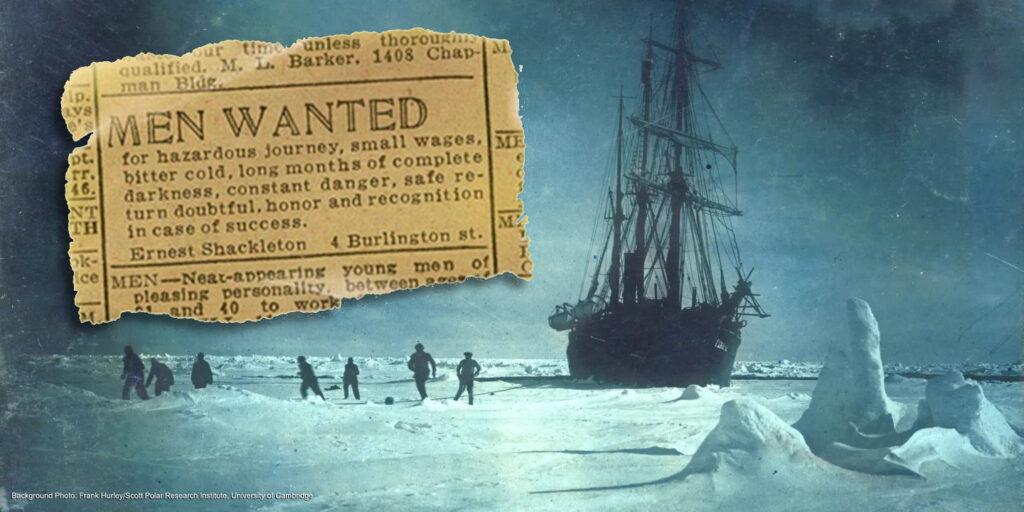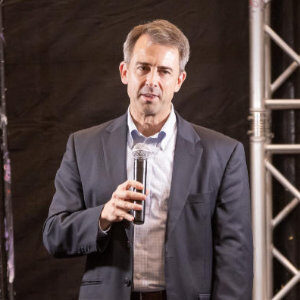The image you see here is one of many renditions of an iconic (and possibly apocryphal) advertisement attributed to Sir Ernest Shackleton, a British explorer best known for his expeditions to Antarctica. The ad, so the story goes, was placed in London newspapers in the early 1900s, prior to Shackleton’s famous Imperial Trans-Antarctic Expedition (1914–1917).
For clarity, the text reads:
“MEN WANTED for hazardous journey, small wages, bitter cold, long months of complete darkness, constant danger, safe return doubtful, honor and recognition in case of success.”
Because there is no definitive proof that Shackleton actually placed this ad, many historians believe the story might be more myth than fact. However, it has become an iconic piece of adventure lore, symbolizing the extreme, HISTORICALLY FACTUAL challenges Shackleton and his crew faced.
Shackleton’s expedition, famous for its near disaster, as his ship, aptly called Endurance, became trapped in ice, eventually sinking. Despite the harsh conditions and the monumental struggle for survival, Shackleton and his crew managed to return safely, cementing his legacy as a leader of extraordinary courage and perseverance (In early 2022 the wreck of Endurance was found in the Weddell Sea, 10,000 feet down. It remains a protected historical site under the Antarctic Treaty.).
History aside, let’s assume for a moment that the ad is real. What might compel Shackleton, clearly in need of a crew, to compose such a sales pitch? Clearly, he was seeking individuals of a certain sort. He knew he needed a crew that would face truth, had strong character, and would do what it took to help execute the mission at hand.
Why was Shackleton flooded with applicants? It was an opportunity to achieve life fulfillment or authentic leadership. Discovering your path to greatness results in a full life.
Like Shackleton, the Authentic Leadership Foundation is clearly in need of a crew.
While Shackleton’s ad described the physical challenges to expect, below are the personal growth challenges to expect today, to achieve authentic leadership for ourselves, educators, students, and young adults. In all cases, the reward is a full life.
In several important ways, Shackleton’s ad serves as a profound metaphor for authentic leadership, especially in terms of the qualities required to lead in difficult and uncertain times. For example:
- It’s Brutally Honest and Transparent. No sugarcoating here on what people are signing up for. Instead of making false promises or minimizing the risks, it lays out the stark truth; to paraphrase: “You may not return, but if you do, it will be to Glory (in a virtuous sense).” Don’t you wish most leaders were this transparent? Indeed, from a marketing standpoint, it may not generate many leads, but it would attract those who knew exactly what they were signing up for, fostering a team that could trust their leader because he was honest from the beginning.
- It Sets Realistic Expectations. I often remind myself: Stress is the deficit between expectations and reality. Authentic leaders don’t create false hopes; they prepare their teams for the challenges ahead, allowing them to enter with clear expectations. By highlighting the potential risks and difficulties in the ad, Shackleton would have filtered out anyone who wasn’t ready for the hardships, ensuring that only committed individuals, who understood how achieving the expedition’s mission helped them with their own—those who could handle adversity—would enlist.
- It’s about Greatness. While it lays out grim conditions, it also offers the potential for great reward. This taps into something bigger than the material… personal fulfillment, legacy, and the satisfaction of having accomplished something great. Authentic leaders often inspire through a shared mission appealing to people’s deeper motivations, like contributing to a mission that’s bigger than their own. An authentic leader doesn’t fear failure, but the good they could’ve done and didn’t….
- It Demands Self-Awareness. Shackleton’s willingness to call for such a bold endeavor (even though it doesn’t specify the journey’s destination) reflects not just his courage (virtue), but also his self-awareness of the challenges (truth) of what lies ahead. Further, it expects nothing less of anyone who signs up.
- It Makes for a Resilient Team. This copy was written to attract individuals who were not just physically tough, but mentally and emotionally resilient (principled in their decision-making and mature in their virtue). Authentic leadership requires assembling a team that is both skilled and aligned with the leader’s principles and virtue —here, those who could endure danger and hardship, yet still strive for greatness. In practice, such leaders build teams capable of facing adversity without losing their sense of mission.
- It Makes No Promises. Authentic leaders know that the future holds many unknowns, yet they remain steady and optimistic even when the outcome is far from certain. Shackleton’s expedition itself, though fraught with peril, ended in survival and success in a different way than originally planned. Leading through uncertainty with confidence, and most significantly, flexibility, as Shackleton apparently did, is a hallmark of authentic leadership.
So, why bring this up? And why might I refer to it as “The Worst, and Most Successful Sales Pitch in History?” The truth is, I am not, especially due to the reality that this ad has never actually been proven to be run. Indeed, the image we share is only one of many variations out there. For our point – it doesn’t matter. It still represents an ideal that GREATNESS surely requires.
So what is the worst, and most successful, “sales pitch” in history?
“…If anyone wants to come after Me, he must deny himself, take up his cross, and follow Me.”
– Matthew 16:24 (NASB)
From what I know of marketing, I would never have signed off on that.
But then again, what do I really know? Clearly, while this “pitch” is pithier than our fabled Shackleton ad, there is little question to its validity, thanks to manuscript attestation. Beyond brevity are some other key differences, the first of which is its obvious success: more than 2,000 years later, the Christian faith claims billions of believers.
A second, perhaps most significant, key difference is this: while Shackleton could not promise a safe return, or even survival, Christ literally takes it all the way Home: “For whoever wants to save his life will lose it; but whoever loses his life for My sake will find it.” (Matthew 16:25 NASB)
The only caveat I will add to this last point is the “promise” of Greatness – and indeed that is what God calls us to be, on a path He has laid out for each of us.
This is most significant for young people: their restless hearts are not satisfied by comfort, because that is not what God intends.
What does God intend? He has made each one of us, and each one of our youth, for Greatness.
And it is incumbent upon our generation to help today’s youth discover this path. Will you join us?




